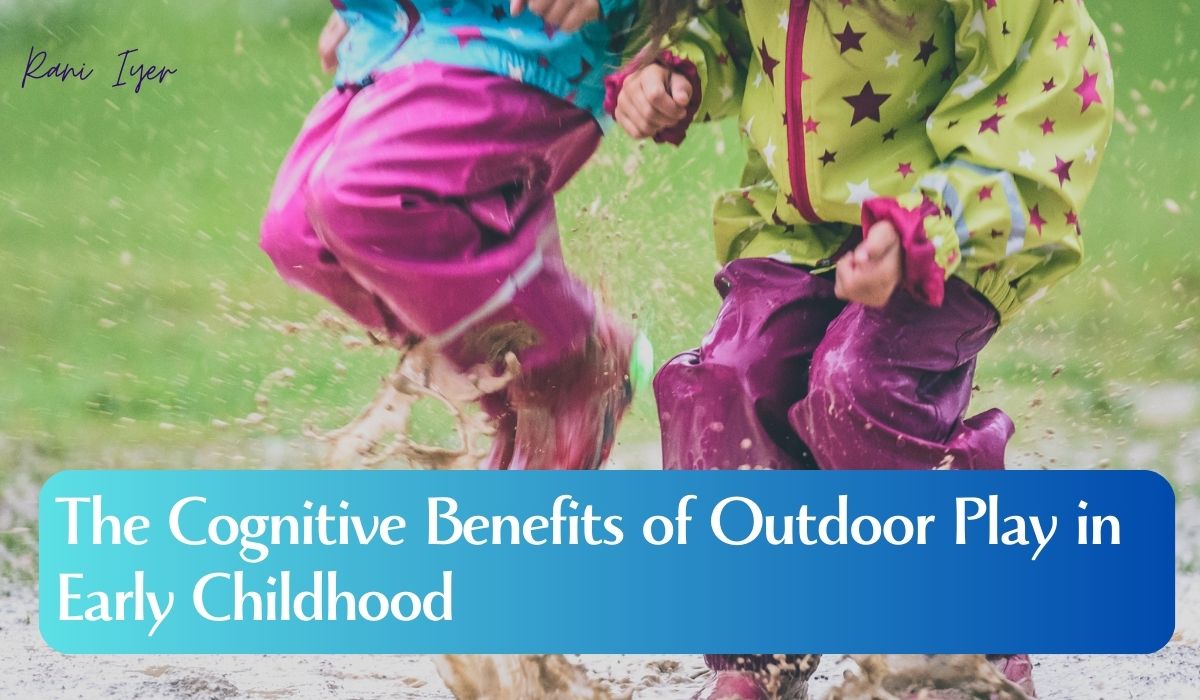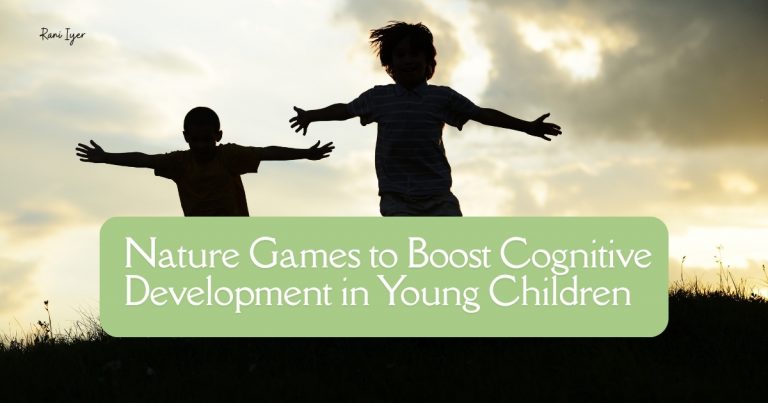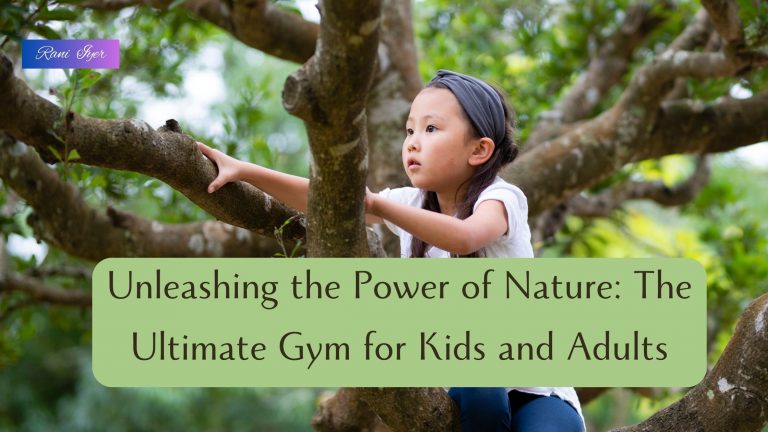The Cognitive Benefits of Outdoor Play in Early Childhood: Unlocking Nature’s Classroom
In a screen-dominated world, the simple act of outdoor play in early childhood offers profound cognitive benefits that nurture young minds. At Raniyer.com, we believe in fostering holistic child development through nature-inspired, joyful experiences. Playing in the backyard, park, or any open area with natural elements isn’t just fun—it’s a powerful tool for boosting brain development, creativity, and emotional well-being. This blog post explores the science-backed cognitive advantages of outdoor free play, highlights the impact of “digital fog,” and shares easy, engaging activities for parents to spark meaningful play at home.
Why Outdoor Play Matters for Cognitive Development
Outdoor play, especially unstructured free play, is a cornerstone of early childhood development. It engages children’s senses, encourages exploration, and fosters problem-solving in ways that indoor or screen-based activities often can’t. Research consistently shows that exposure to nature and open-ended play enhances cognitive functions like attention, memory, and executive functioning.
Scientific Evidence Supporting Outdoor Play
- Improved Attention and Focus: A 2008 study published in The Journal of Attention Disorders found that children with ADHD who spent time in green spaces showed significant improvements in attention and concentration compared to those in urban or indoor settings. The natural environment acts as a “restorative” space, reducing mental fatigue and enhancing focus.
- Enhanced Executive Function: Executive function—skills like planning, self-regulation, and problem-solving—is critical for academic success. A 2015 study in Developmental Psychology revealed that children engaging in unstructured outdoor play demonstrated better impulse control and working memory than those in structured or indoor activities.
- Boosted Creativity and Imagination: Free play in natural settings encourages divergent thinking. A 2010 study in Children, Youth and Environments showed that children who played in natural environments exhibited more imaginative and inventive play scenarios compared to those in controlled settings.
- Stress Reduction and Emotional Resilience: Nature has a calming effect on young minds. A 2019 meta-analysis in Scientific Reports found that just 20 minutes of outdoor play in green spaces lowered cortisol levels, reducing stress and promoting emotional well-being, which supports cognitive clarity.
- Physical Activity and Cognitive Growth: Outdoor play often involves running, climbing, and exploring, which increase blood flow to the brain. A 2016 study in Pediatrics linked regular physical activity in natural settings to improved academic performance and cognitive processing speed in children aged 4–7.
These studies underscore that outdoor play isn’t just a break from routine—it’s a vital component of cognitive development, equipping children with skills to thrive academically and socially.
The Digital Fog: A Barrier to Cognitive Growth
In contrast to the benefits of outdoor play, excessive screen time creates what experts call “digital fog”—a state of mental overload that clouds focus, creativity, and emotional regulation. The American Academy of Pediatrics notes that children aged 2–5 spend an average of 2–3 hours daily on screens, often at the expense of active play. This overexposure can lead to:
- Reduced Attention Span: A 2019 study in JAMA Pediatrics linked prolonged screen time to weaker attention and cognitive control in preschoolers.
- Impaired Social Skills: Digital fog limits opportunities for face-to-face interaction, which is crucial for developing empathy and communication skills.
- Sleep Disruption: Blue light from screens disrupts melatonin production, affecting sleep quality and cognitive performance, according to a 2020 study in Sleep Medicine.
At Raniyer.com, we advocate for balancing screen time with outdoor play to clear the digital fog and nurture sharp, resilient minds. Nature offers a sensory-rich antidote to the overstimulation of devices, grounding children in the present moment.
The Power of Free Play in Nature
Free play—unstructured, child-led activities without rigid rules—amplifies the cognitive benefits of outdoor time. Unlike organized sports or guided activities, free play allows children to experiment, take risks, and make decisions, fostering independence and critical thinking. Whether it’s digging in the dirt, building a fort, or chasing butterflies, these moments in the backyard or a nearby park spark curiosity and problem-solving.
Why Free Play Works
- Encourages Risk-Taking: A 2018 study in Early Childhood Research Quarterly found that free play in natural environments promotes safe risk-taking, which builds confidence and decision-making skills.
- Fosters Social Skills: Collaborative free play, like negotiating rules for a game, enhances communication and teamwork, as noted in a 2017 study in Journal of Play.
- Stimulates Sensory Development: Nature engages all five senses, strengthening neural connections. A 2016 study in Frontiers in Psychology linked sensory-rich outdoor play to improved memory and language skills.
By letting children lead their play in natural settings, parents create a space for cognitive and emotional growth that structured activities can’t replicate.
Easy Outdoor Play Activities for Parents and Kids
You don’t need a sprawling forest to unlock the benefits of outdoor play—your backyard, balcony, or local park will do. Here are simple, nature-inspired activities from Raniyer.com to make outdoor play engaging and cognitively enriching. These are designed for children aged 3–7 and require minimal setup.
1. Nature Treasure Hunt
Cognitive Benefits: Enhances observation, memory, and categorization skills.
What You Need: A small basket or bag, an open area with natural elements (grass, trees, rocks).
How to Play:
- Create a list of items to find (e.g., a smooth stone, a red leaf, a stick shaped like a Y).
- Encourage your child to explore and collect items, describing their textures and colors.
- For older kids, add challenges like “find something that smells sweet” to engage multiple senses.
Make It Fun: Turn it into a story—pretend you’re explorers searching for magical treasures. Discuss the finds afterward to boost language skills.
2. Backyard Obstacle Course
Cognitive Benefits: Improves planning, spatial awareness, and problem-solving.
What You Need: Household items (hula hoops, ropes, chairs), natural elements (logs, stones).
How to Play:
- Set up a course with tasks like crawling under a rope, hopping over stones, or balancing on a log.
- Let your child help design the course to encourage creativity.
- Time the run or add pretend “missions” (e.g., deliver a message to the tree).
Make It Fun: Add a theme, like a jungle adventure or superhero training, to spark imagination.
3. Mud Kitchen Creations
Cognitive Benefits: Boosts creativity, sensory processing, and fine motor skills.
What You Need: Old pots, spoons, buckets, dirt, water.
How to Play:
- Set up a “kitchen” area where kids can mix dirt and water to make “pies” or “soups.”
- Add natural ingredients like leaves, petals, or twigs for “recipes.”
- Encourage storytelling about what they’re cooking and who it’s for.
Make It Fun: Join in as a “customer” at their restaurant, asking questions to stimulate language and social skills.
4. Nature Art Gallery
Cognitive Benefits: Fosters divergent thinking and emotional expression.
What You Need: Natural materials (sticks, leaves, flowers), a flat surface.
How to Play:
- Ask your child to create a picture or pattern using found items (e.g., a flower made of petals or a stick house).
- Discuss their creation, asking open-ended questions like “What story does this tell?”
- Display the art on a tree or fence for a “gallery show.”
Make It Fun: Take photos of their creations to create a digital scrapbook, balancing screen time with creative output.
5. Sound Safari
Cognitive Benefits: Sharpens auditory processing and attention.
What You Need: Just your ears and an outdoor space.
How to Play:
- Sit quietly with your child and listen for natural sounds (birds, wind, rustling leaves).
- Ask them to identify or mimic the sounds, counting how many they hear.
- For older kids, create a “sound map” by drawing what they hear and where it’s coming from.
Make It Fun: Pretend you’re detectives tracking animals by their sounds, adding a narrative layer.
These activities are low-cost, adaptable, and aligned with Raniyer.com’s mission to inspire joyful, nature-based learning. They encourage parents to be play partners, not directors, fostering child-led exploration.
Tips for Making Outdoor Play a Habit
- Start Small: Even 15–20 minutes of daily outdoor play can make a difference. Use your yard or a nearby green space.
- Limit Screen Time: Follow the American Academy of Pediatrics’ guideline of 1 hour or less of high-quality screen time for ages 2–5 to prioritize active play.
- Embrace Mess: Dirt and mud are part of the fun—dress kids in old clothes and let them explore.
- Model Joy: Show enthusiasm for nature by pointing out interesting sights or sounds, reinforcing curiosity.
- Create Routines: Schedule “nature time” after meals or before bedtime to build consistency.
Raniyer.com’s Commitment to Nature-Inspired Growth
At Raniyer.com, we’re passionate about empowering parents to raise curious, resilient children through meaningful play. Outdoor play aligns with our ethos of nurturing creativity and connection with the natural world. By stepping away from screens and into nature, families can clear the digital fog and unlock cognitive benefits that last a lifetime.
Nature as the Ultimate Classroom
Outdoor play in early childhood is more than recreation—it’s a gateway to cognitive growth, emotional balance, and creative expression. Backed by science, free play in natural settings enhances attention, problem-solving, and resilience, preparing children for a bright future. By engaging in simple, joyful activities like treasure hunts or mud kitchens, parents can transform their backyard into a classroom of discovery.
Ready to embrace nature’s potential? Visit Raniyer.com for more tips, activities, and resources to make outdoor play a cornerstone of your child’s development. Let’s clear the digital fog and let young minds flourish in the fresh air.
outdoor play, cognitive benefits, early childhood, free play, nature play, digital fog, child development, backyard activities, parenting tips, nature-based learning, Raniyer.com.




